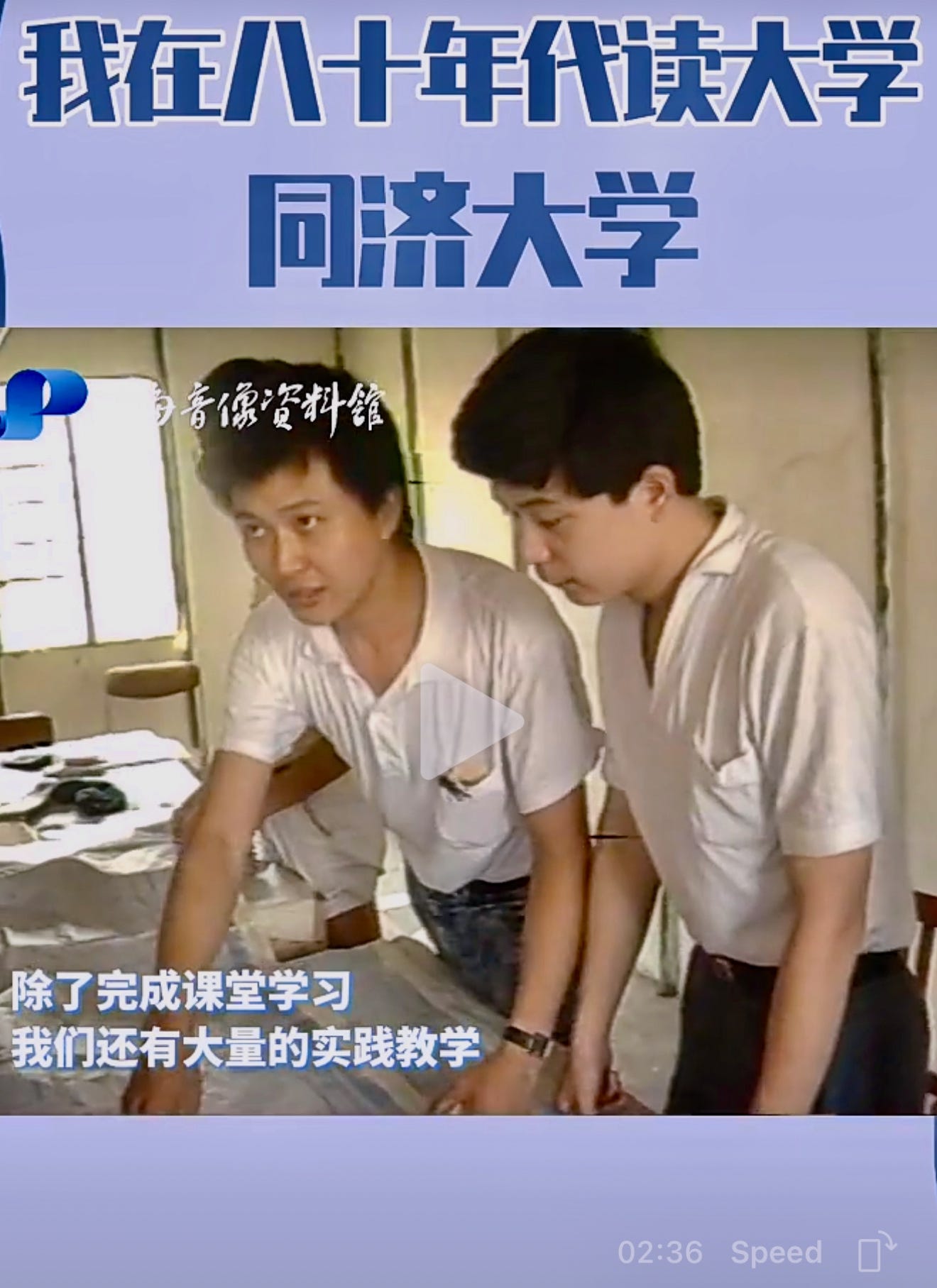When Others Recognize You Better Than You Do
Tracing the imprint of being bold before I had a name for it
There it was: an old video clip from the 1980s about student life at Tongji University in Shanghai, making the rounds in WeChat groups chat. It was less than a minute long — a fleeting scene of a young man leaning over a blueprint, completely absorbed in hands-on teaching. My friends spotted me instantly.
“@Kefei,好像有年轻的Kefei。”
I stared at the screen, uncertain. Could that really be me? I felt a wave of disbelief.
They were so sure. I was not.
“你们一说我有点动摇了,但说真的,我一点印象都没有了…”
(“Now that you mention it, I’m starting to waver… but honestly, I don’t remember this at all...”)
I had no memory of the moment, no conscious link to the posture, the expression, the gestures that everyone else immediately associated with me. And yet, as the comments kept coming, something inside me began to shift. What began as hesitation morphed into reluctant recognition.
The feeling was unfamiliar, but not unwelcome.
Until my wife joined and confirmed it instantly: “牛仔裤、手表、烫发是他的标配。” (“Jeans, a watch, and permed hair.”)
Others chimed in with “领导风范。” (“leadership aura”),
and “标杆式人物。” (“a model figure.”)
Really? Me?
Apparently, the way I dressed wasn’t just fashion in the 80s, it was part of a silent identity. A white shirt and blue jeans may seem simple, but to them, it marked a kind of confidence. A sense of self. I hadn’t seen it that way back then. I didn’t feel bold or remarkable. I was just being me. But through their eyes, I began to see that I had already become someone others noticed — even appreciated ( to equally reflect their image at that time, likely or not ).
And then came the Rado watch.
“哇,带高级手表” (“Wow, wearing a luxury watch.”)
Another friend added a teasing word from our youth: “烧包” — a playful jab at someone showing off.
I could only laugh. I really had no idea I was giving off that impression.
And then a question came:
“你当年的Rado表还在吗?增值多少?”
(“Is your Rado watch still around? Did it appreciate in value?”)
It probably is. Somewhere. In a drawer, tucked behind the passing of decades.
“好像在,但绝对谈不上‘值不值’。” (It might still exist, but it’s definitely not about value anymore, I responded.)
Back then, it was a practical purchase. It didn’t feel symbolic. But looking back now, I realize that watch did carry something: a quiet confidence. It wasn’t about flaunting success. It was about stepping into a world where I was starting to take myself seriously, even if I couldn’t fully articulate it. The watch didn’t appreciate in price. But its presence, frozen in time in that video, became a symbol — not of luxury, but of growth.
The conversation spiraled joyfully into memory.
Then someone brought up the little rituals of youth. Someone else joked about boomboxes, horn-rimmed sunglasses, and those Nestlé coffee tins we all shared like they were gold. It was a full sensory recall: cassette tapes blaring on campus, the smell of instant coffee, our idealism stitched loosely into every gesture.
We laughed, but underneath that laughter was something more — a mutual recognition of who we were before we knew who we were becoming.
I added a message of my own: “当年留校带学生施工建筑实习,… 苦差。”
(“That year, I stayed behind to lead students in a building construction internship, … it was hard and thankless.”)
I remember that summer vividly. The heat. The pressure. The quiet responsibility of guiding others when I barely had a foothold myself. At the time, I didn’t call it leadership. I didn’t even call it bold. I just thought it needed to be done.
Now I see: that was boldness in disguise.
Showing up, and leaning into difficulty without waiting for recognition. These are the early patterns of courage that only make sense in hindsight.
Just when I thought the conversation was winding down, a friend wrote:
“这个小伙子?还真被我认出来了!”
(“That guy? I really recognized him!”)
That moment touched me more than I expected. Not just because someone recognized me after close 40 years — but because they saw in me something I had long stopped seeing in myself.
It wasn’t about style or memory. It was about presence.
This group chat started as a nostalgic ripple. It became a mirror.
In koffeemocha, I often write about the boldness required during life’s transitions — not only in the big leaps, but in the quiet ways we carry ourselves. This was one of those moments.
Boldness doesn’t always announce itself. Sometimes it’s wrapped in simplicity:
a white shirt, a forgotten watch, a group of peers still watching closely.
I didn’t aim to be bold. I simply moved forward — curious, sincere, and willing. But over time, from student to mentor, from hometown to global projects, from youth to encore chapter today, those small acts of showing up became a quietly bold life.
And maybe the boldest part of all is letting others remind you of your own story —especially the parts you forgot.
This is a reflection from my book-in-progress, Koffeemocha: Being Bold in Transition.




